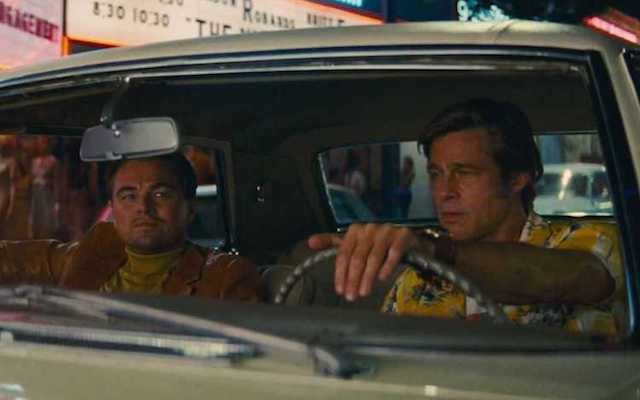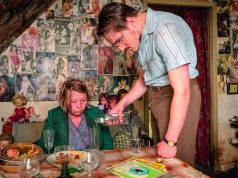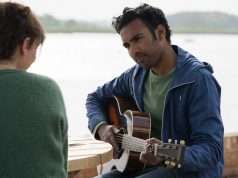
There was cause for concern when Quentin Tarantino announced he was making a movie involving the Manson Family murders. It seemed likely, given QT’s usual approach, that the result would be tacky and exploitative, maybe even turn a horrific (and, historically speaking, comparatively recent) tragedy into violent entertainment. Most of his films have had killers for protagonists, after all, and the killing has been part of the fun.
But it turns out that Charles Manson and his crew are only in the periphery of “Once Upon a Time … in Hollywood,” 98% of which is one of Tarantino’s gentlest movies (the other 2% — YIKES). Not only are they not the focus, they are portrayed as useless hippies who gallingly desecrate the sanctity of Tinseltown, disrupting the chummy, fraternal idyll of moviemaking. This, even more than the killings, seems to offend Tarantino, who spends most of “OUATIH” gamboling through 1969 Hollywood like a kid in a nostalgia store. For all his fetishes, QT’s favorite is Hollywood of 40-60 years ago, and this is his moseying, sentimental love letter to it.
The story is really about Rick Dalton (Leonardo DiCaprio), once the star of a very popular Western TV series, now getting by on TV guest spots and roles in mediocre films. He’s dangerously close to being washed-up, though still living happily in a nice house next door to director Roman Polanski and his beautiful new wife, Sharon Tate (Margot Robbie). Encouraged by his best friend and stunt double, Cliff Booth (Brad Pitt), and by a movie producer (Al Pacino) who offers advice, Rick sets out to revive his career before it’s too late, throwing himself passionately into his latest villain-of-the-week gig on “Lancer” (a real show, 1968-70).
As all of this is unfolding, pleasantly and unhurriedly, we see Sharon Tate living her life. Her husband is gone a lot, but she has friends, including ex-boyfriend Jay Sebring (Emile Hirsch). Sharon is pregnant and happy, and when she catches a matinee of a film in which she has a supporting role (“The Wrecking Crew”), she shows childlike delight at hearing the audience’s warm response to her onscreen slapstick.
In the sidelines, there’s a bunch of mostly female hippies hanging around town. We understand them to be the Manson family, though the movie doesn’t call them that. Manson himself (played by Damon Herriman) has only a few seconds of screen time, and his last name isn’t given. Cliff the stunt double has an encounter with the group at the ranch where they’re camped out, and Tarantino does great work milking tension from the scenario in such a way that you’d be nervous even if you didn’t know who they were. They’re an ominous low note heard periodically throughout the film, usually not loud enough to drown out the sunny La La Land story happening on the main stage.
Rick and Cliff have a surprisingly tender relationship (for a Tarantino movie anyway), DiCaprio and Pitt giving terrifically open, good-natured performances. Rick’s determination to do his best in his small TV role is both hilarious and endearing; his slight stammer when he’s nervous and his heart-on-sleeve emotions are just endearing. Pitt, too, is flat-out lovable as Cliff, to the extent that we’re disinclined to believe it when we hear unsavory rumors about the stuntman’s past.
Most of QT’s usual touchstones are here — brutal violence, humorous profanity, feet. There are flashbacks, including an amusing and possibly embellished vignette to a run-in Cliff had with Bruce Lee (Mike Moh); an alt-reality scene from “The Great Escape” starring Rick in the Steve McQueen role; a narrator who pops up startlingly to give a clarification early on, then disappears again until the end; one- or two-scene appearances by a cavalcade of actors — Kurt Russell, Timothy Olyphant, Luke Perry, Bruce Dern, Michael Madsen, Damian Lewis, Dakota Fanning, Rumer Willis, Scoot McNairy, Margaret Qualley, etc., etc. — some based on real people, some not. Tarantino’s fond obsession with period details means a nonstop stream of 1969 radio (including commercials!) heard on innumerable car stereos as the characters tool around an impeccably recreated L.A. of 50 years ago. And I don’t remember if we already knew that Tarantino hated hippies, but we know now.
Unlike many Tarantino films, though, this one isn’t plot-heavy. There’s actually very little story: It’s a “let’s hang out with these guys” situation, get to know them, learn snippets of their histories, spend a couple hours shootin’ the breeze. It’s not my favorite Tarantino film, but it’s the one whose world I’d most like to live in (up to a point). If most QT productions are a bracing slap in the face, this one is a friendly arm around the shoulder. After the harsh cynicism of his last few movies, it’s nice to see Tarantino reveling in the things he loves.
B+ (2 hrs., 41 min.; )





